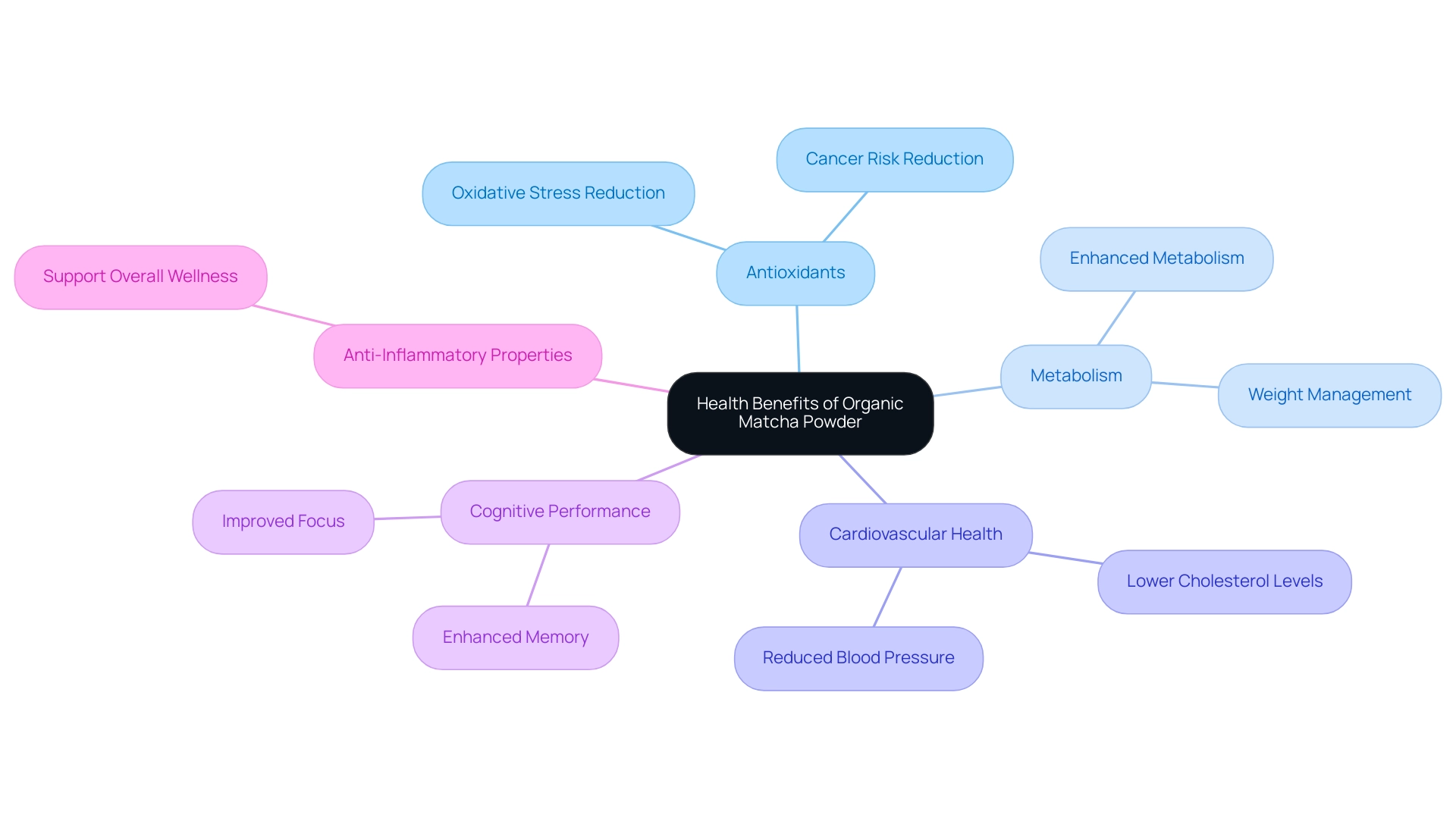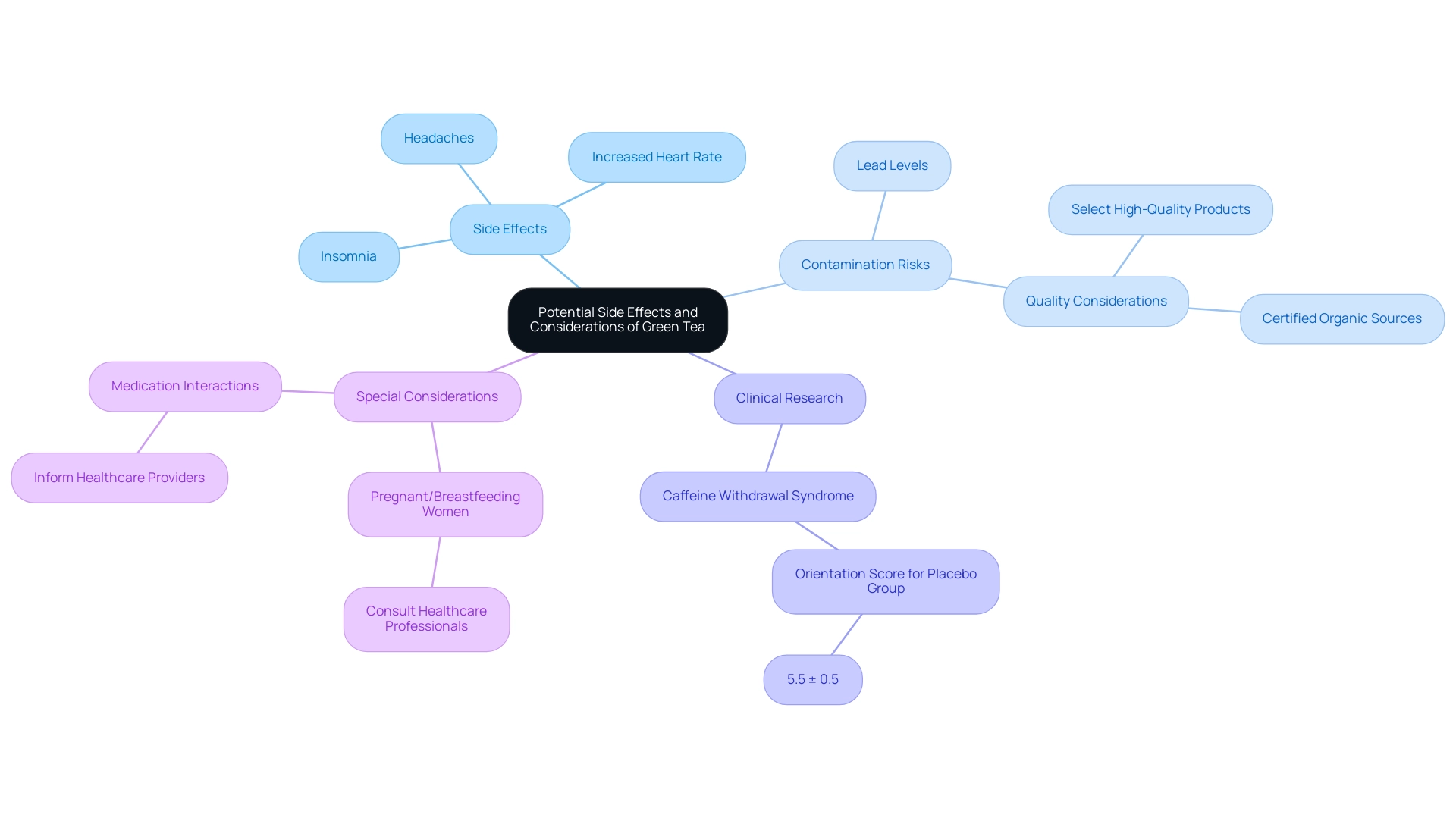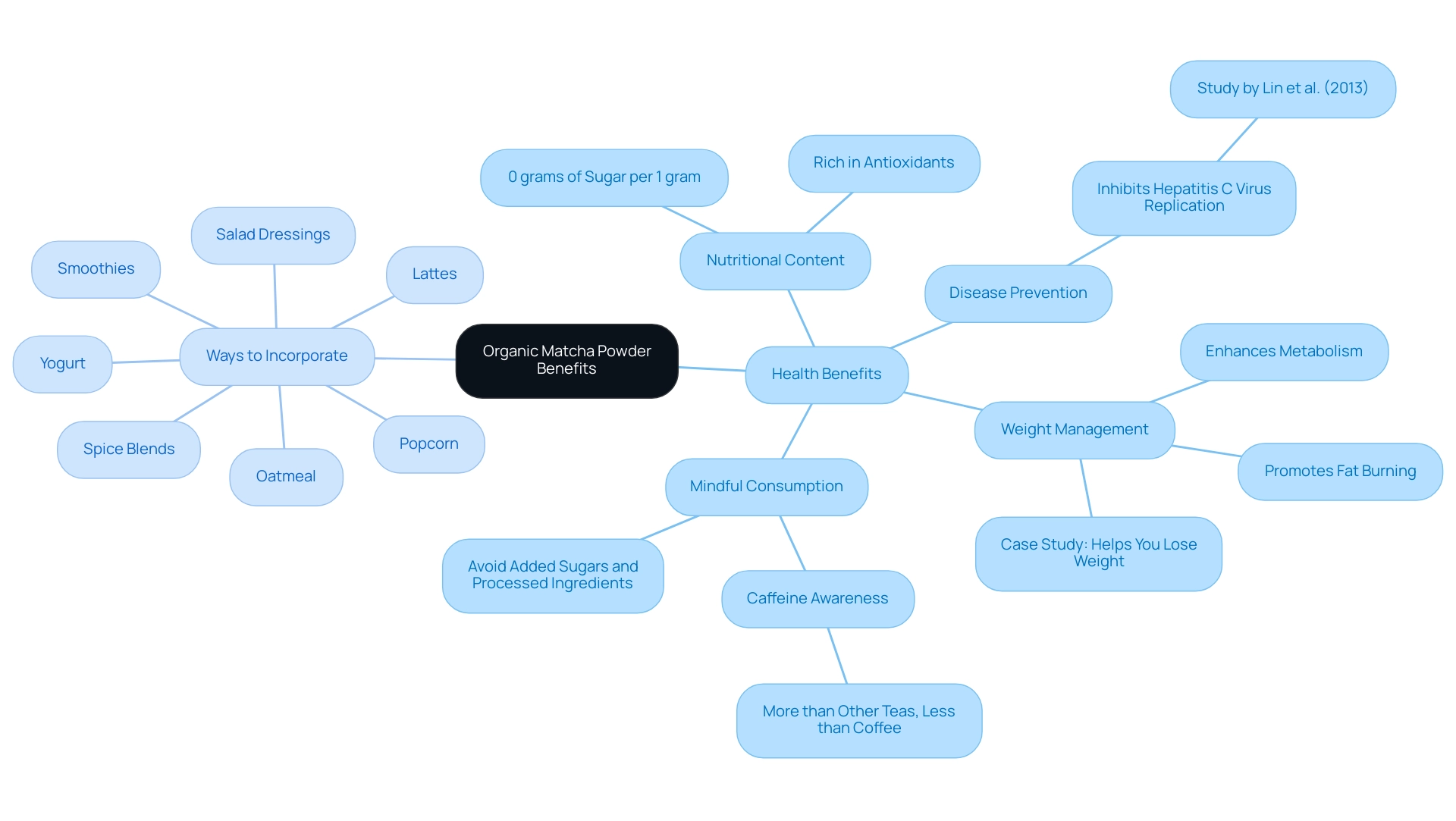Introduction
Organic matcha powder has gained recognition as a nutritional powerhouse, captivating health enthusiasts with its vibrant green color and unique flavor. Unlike traditional green tea, matcha allows consumers to enjoy the entire leaf, significantly amplifying its nutritional benefits.
Rich in antioxidants, particularly catechins, matcha is not only instrumental in combating oxidative stress but also plays a crucial role in enhancing metabolism and supporting cardiovascular health. As research continues to unveil its myriad advantages, incorporating matcha into daily diets presents an appealing opportunity for individuals seeking to elevate their wellness journey.
This article delves into the many facets of organic matcha, exploring its health benefits, practical applications in meals, and essential considerations for safe consumption.
1. Understanding Organic Matcha Powder: A Nutritional Powerhouse
Organic green tea powder is a finely ground form of tea made from specially cultivated leaves, distinguished by its vibrant green hue and unique flavor profile. Unlike conventional green tea, which involves steeping the leaves, this powdered variety allows for the consumption of the entire leaf, thereby significantly enhancing its nutritional content. It is particularly abundant in antioxidants, especially catechins, which have been shown to possess greater antioxidant capacity than glutathione, vitamin C, and flavonoids.
This highlights their essential role in maintaining cellular redox homeostasis, as noted by researchers Grzesik et al. To prepare the green tea powder, add 6 ounces of 175-degree water and whisk until frothy for the best experience. Furthermore, this green tea is rich in L-theanine, an amino acid known to promote relaxation without inducing drowsiness, making it a valuable addition to wellness-focused diets.
However, caution is advised when consuming green tea alongside stimulant medications due to its caffeine content, as combining green tea with these medications may lead to heart problems and reduce the effectiveness of atorvastatin. The cultivation process of organic tea, which excludes synthetic pesticides and fertilizers, leads to a growing interest in questions like: What are the
benefits of organic matcha powder as a healthful choice for consumers seeking natural products? Recent studies highlight the numerous advantages related to the antioxidants present in green tea, leading to the question: What are the benefits of organic matcha powder, as real-world examples illustrate its beneficial effects on individuals who include it in their diets?
For those seeking indulgent yet health-conscious options, consider making a Chocolate Coconut Pea Protein Shake or a Green Tea Matcha Shake. The Chocolate Coconut shake blends:
- 1 cup of coconut milk
- 2 scoops of pea protein
- 1 tablespoon of cocoa
- ½ cup of ice cubes, topped with shredded coconut for a delightful treat.
Meanwhile, the Green Tea shake combines:
- 1 brewed green tea bag (room temperature)
- 2 scoops of pea protein
- 1 teaspoon of green tea blend
- ½ cup of ice cubes, whisked until smooth for an antioxidant-rich beverage, ideal for wellness enthusiasts seeking nutritious and enjoyable shake recipes.
2. Exploring the Health Benefits of Organic Matcha Powder
Organic green tea powder is recognized for its numerous health advantages, largely attributed to its high concentration of antioxidants, which play a crucial role in combating oxidative stress associated with various chronic diseases. Significantly, green tea powder may aid in
slowing premature aging and lowering the risk of specific cancers. Recent findings demonstrate that the catechins present in this green tea can significantly enhance metabolism and facilitate weight management, making it particularly appealing to health-conscious individuals.
Moreover, this green tea has been shown to improve cardiovascular health by lowering cholesterol levels and reducing blood pressure. The amino acid L-theanine, found abundantly in green tea, contributes to enhanced focus and mental clarity, rendering it a preferred choice for those seeking improved cognitive performance. As Hu observes, 'Including sugar, cream, or other processed components won’t diminish the advantages of this green tea, but it can adversely affect the body regardless of it.'
Additionally, the potential anti-inflammatory properties of this green tea support overall wellness, solidifying its place as a beneficial component of a healthy lifestyle. However, individuals who already consume coffee should exercise caution; combining green tea with coffee may lead to excessive caffeine intake, necessitating careful monitoring of total caffeine levels, as highlighted in the case study on caffeine management with coffee. As research progresses, the advantages of organic green tea are gaining more backing from scientific proof.
3. The Role of Organic Matcha in a Balanced Diet
Incorporating organic green tea powder into a balanced diet raises the question: what are the benefits of organic matcha powder, as it is both simple and enjoyable, offering diverse applications that align with contemporary health trends? When considering matcha, it's important to ask, what are the
benefits of organic matcha powder, as it can be seamlessly integrated into smoothies, baked goods, or enjoyed as a traditional tea? For health-conscious individuals seeking a healthier start to their day, a green tea latte serves as an excellent alternative to coffee, prompting the question, what are the benefits of organic matcha powder, as it provides sustained energy without the jittery side effects often associated with caffeine?
Additionally, incorporating green tea powder into oatmeal or yogurt raises the question, what are the benefits of organic matcha powder, as it not only enhances flavor but also enriches the meal with antioxidants. For an indulgent twist, consider these delicious shake recipes:
Chocolate Coconut Pea Protein Shake:
-
Ingredients:
- 1 cup coconut milk (or other dairy-free milk alternative)
- 2 scoops of pea protein powder
- 1 tablespoon cocoa powder
- ½ cup ice cubes
-
Instructions:
- In a blender, combine all ingredients.
- Blend until smooth and pour into a glass or jar.
- Top with shredded coconut flakes and/or dark chocolate chips for an extra boost of flavor!
Green Tea Matcha Shake:
-
Ingredients:
- 1 brewed green tea bag (room temperature)
- 2 scoops of pea protein powder
- 1 teaspoon matcha powder
- ½ cup ice cubes
-
Instructions:
- In a blender, combine all ingredients.
- Blend until smooth and enjoy! You can also incorporate some honey or maple syrup if you like your shakes sweeter!
Research indicates that the concentration of antioxidant compounds in green tea is influenced by the timing of the harvest, with Daily Matcha showing superior antioxidant properties. Unno et al. found as much as 44.65 mg/g of that compound in green tea samples, underscoring its rich nutrient profile.
Individuals may wonder what are the benefits of organic matcha powder when incorporating green tea powder into various dishes, including indulgent shakes, to significantly increase their nutrient intake while savoring its distinct taste. However, it is crucial to consume green tea in moderation—ideally 1–2 cups per day or up to 2 teaspoons—to manage its caffeine content, which, although lower than that of coffee, may still impact those who are particularly sensitive. This balanced approach ensures that the health benefits of green tea lead us to ask, what are the benefits of organic matcha powder, while maintaining overall dietary harmony.
4. Potential Side Effects and Considerations
Organic green tea powder is widely regarded as safe for most individuals; however, it is important to be aware of potential side effects. The caffeine content in green tea can lead to adverse effects in sensitive individuals, including:
- Insomnia
- Increased heart rate
- Headaches with excessive consumption
Clinical research has documented caffeine withdrawal syndrome, with an orientation score for the placebo group at start-up being 5.5 ± 0.5, highlighting the impact of caffeine on individuals.
Recent studies have raised concerns about the presence of lead and other contaminants in green tea, particularly when sourced from non-reputable suppliers. Notably, this green tea, being made from whole leaves, may exhibit higher lead levels compared to other teas. To mitigate these risks, it is advisable to select high-quality, certified organic green tea products.
Pregnant or breastfeeding women should particularly consult with healthcare professionals prior to incorporating green tea into their diets to ensure optimal safety and to avoid any potential interactions with medications. The case study titled '
Safe Consumption of Matcha' emphasizes the importance of informing healthcare providers about all medications to prevent interactions and side effects. As noted by Acosta L. in research discussing hepatotoxicity associated with high doses of green tea extract,
1'the effect of catechol-O-methyltransferase and uridine 5'-diphospho-glucuronosyltransferase 1A4 genotypes' is significant,
2
making it crucial to approach consumption of this tea with informed caution.
5. Conclusion: Embracing Organic Matcha Powder for Holistic Wellness
Organic green tea is acknowledged as a nutritional powerhouse, offering numerous health benefits that make it a valuable addition to a balanced diet. Notably, a half teaspoon (1 gram) of green tea powder contains 0 grams of sugar, reinforcing its suitability for health-conscious individuals. Its rich antioxidant profile, particularly high in catechins, contributes to its reputation for supporting overall wellness.
Research indicates that green tea phenolic epicatechins, present in powdered green tea, can
inhibit hepatitis C virus replication, highlighting its potential in disease prevention. Additionally, this green tea variety has garnered attention for its role in weight management; studies suggest that the compounds in it can enhance metabolism and promote fat burning, aligning with the known benefits of green tea extracts. A case study indicates that green tea extract can aid in weight loss, suggesting that this type of tea may have similar effects.
Frank Hu, Fredrick J. Stare Professor of Nutrition and Epidemiology at Harvard T.H. Chan School of Public Health, advises those incorporating green tea into their daily routines to be mindful of its caffeine content, which is higher than that of other teas yet lower than coffee, and to avoid added sugars or processed ingredients. He stresses the significance of mindful consumption to maximize wellness benefits.
Furthermore, this green tea powder can be seamlessly integrated into various foods and beverages such as:
- lattes
- smoothies
- salad dressings
- oatmeal
- yogurt
- popcorn
- spice blends
making it versatile for diverse dietary preferences. As consumption trends shift towards comprehensive wellness practices, individuals are increasingly acknowledging the significance of mindful consumption of green tea, ensuring that it complements a varied and nutritious diet. Overall, the summary of health benefits associated with organic matcha powder highlights what are the benefits of organic matcha powder, especially when integrated thoughtfully into daily routines to support holistic wellness goals.
Conclusion
Conclusion
Organic matcha powder stands out as a nutritional powerhouse, offering a wealth of health benefits that make it an excellent addition to a balanced diet. Its rich antioxidant profile, particularly high in catechins, not only combats oxidative stress but also supports overall wellness, weight management, and cardiovascular health. The versatility of matcha allows for easy incorporation into various meals and beverages, enhancing flavor while providing essential nutrients.
As research continues to highlight its advantages, it is crucial to approach matcha consumption mindfully. Awareness of its caffeine content and potential interactions with medications is essential, particularly for sensitive individuals. Selecting high-quality, certified organic matcha can help mitigate risks associated with contaminants.
Incorporating matcha into daily routines can significantly contribute to holistic wellness goals. By opting for this vibrant green powder, individuals can enjoy a delicious and nutritious way to enhance their health while embracing a mindful approach to dietary choices. The journey towards improved well-being can be enriched by the thoughtful inclusion of organic matcha powder, making it a valuable ally in the pursuit of a healthier lifestyle.


































